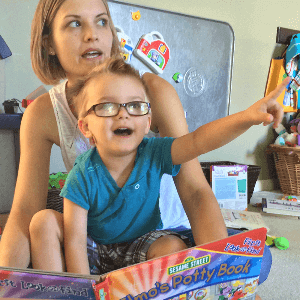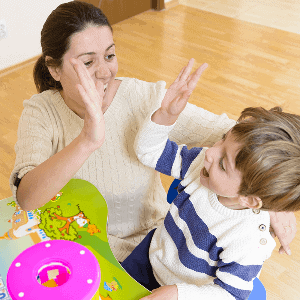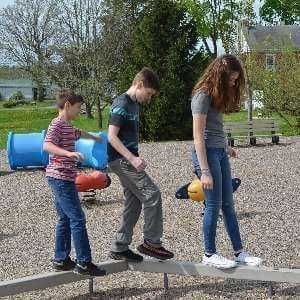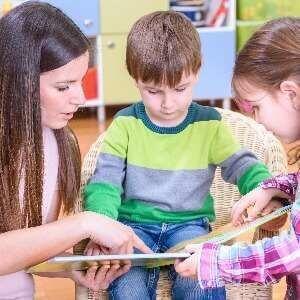Social skill deficits are one of the most common deficits in kids with autism. In fact, since it’s one of the signs of autism, social skills are almost always a topic talked about in a child with ASD. I found that parents and professionals make 3 common mistakes when it comes to autism social skills instruction. So today I want to cover the 3 mistakes to avoid when teaching social skill activities for autism.
I recently did a podcast episode all about teaching autism social skills activities. But today I’m covering the 3 mistakes I see parents and professionals making when it comes to teaching social skills to kids with autism. For more information about autism games for social skills, click the link to my podcast.
Mistake #1: Not Starting with Assessing Autism Social Skills
I found that parents and professionals just want to jump into placement decisions or even goals before an assessment. It’s very dangerous for a professional to say, “okay, we have 3 kindergarten students coming in and these are our usual goals for kindergarteners with autism in social skills or in language.” It’s a very big mistake to just jump into standard goals.
It’s also a mistake for a parent to say, “I just want my child to be included in kindergarten. That’s really what I want. He can have an aide with him, but I don’t want any one-to-one instruction or any social skills instruction.” That’s jumping ahead to the placement and jumping ahead to goals before an assessment. I would focus on an assessment before you decide on how much, if any, inclusion is going to be taking place.
People say, “oh, but he needs socialization.” Well, I’ve had clients where they’ve been put into regular daycare situations, preschools, and even elementary schools with and without support. They’ve either had major problem behaviors or they’re wandering around with little social interactions. I had a little boy who was in a daycare situation unattended and he was wandering around licking the wall. That’s not socialization. That’s a waste of his time. So, don’t jump right into what you want before an assessment. That’s the first mistake, skipping assessment of not just their social skills but their language, their self-care, their academic skills if they are of the right age, their behavior problems. All of this needs to be weaved together before we develop any goals for socialization or social skills development.
Attend a FREE Workshop!
Mistake #2: Trying To Teach High Social Skills
High social skills are things like manners, turn-taking, and greetings. When I was in the early intervention field working with birth to three-year-olds, it was very common for people to be doing role playing like “my turn.” Non-vocal kids were taught to pat their chest and say “my turn, your turn” which is a very high skill. It’s a VB-MAPP level 3 skill. If you’re trying to teach manners, that is almost always going to backfire in children with autism, especially in the beginning. Even teaching greetings, you have to be really careful and do it systematically.
I created a procedure for teaching greetings that’s in my online courses. But I think in general teaching autism social skills that are way too high and focusing on pretend play or doing four exchanges back and forth is a problem. I’ve even seen programs where a parent says, “I have a cow” and then the child’s supposed to say “I have a pig.” That’s not normal conversation. The more we try to teach skills like pretend play, turn-taking, or reciprocal language when the child has a hard time understanding, the weirder the language is going to get. They will develop weirder social skills as well. The social skills interventions for children with autism should be low.
Mistake #3: Expecting Autism Social Skills to Come into Play Without Explicit Teaching
Social skills for kids with autism are complex behaviors that need to be taught very systematically based on assessment, planning, intervening, and evaluating. We don’t want to leave it by chance. We don’t want to just push kids into inclusion and expect social skills to just come along the way.
Autism Strategies for Teaching Social Skills
I was at a conference once and they were selling T-shirts that said, “I have autism” on the front. On the back of the T-shirts, it said, “don’t waste my time.” I think there’s a lot of well-meaning individuals out there trying to teach social skills, but since the skills were too high and they’re not assessing accurately for all kinds of skills, we tend to jump in and have goals for things that are way too high for the kids.
How to Improve Social Skills with Autism
If you want to learn more about improving autism social skills, you can listen to my Turn Autism Around podcast. To learn more about my courses and online community, come to a free online workshop at marybarbera.com/workshop. It’s for parents and professionals, such as behavior analysts. My free workshop does not include any BCBA CEUs, but my courses do. I would love it if you would check it out and see if adding some new knowledge from me and my courses and community might really help to turn things around more for your clients or children.
Attend a FREE Workshop!






